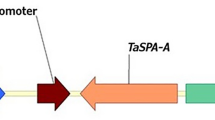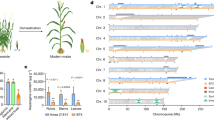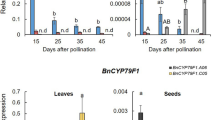Abstract
Cereal seed protein is the major direct source of dietary protein for man and also serves as an indirect source through the feeding of livestock. For non-ruminant animals, such as man, swine and poultry, most cereal seed proteins are deficient in lysine and threonine and much effort has been devoted to their improvement1. Supplementation of barley diets for pigs with lysine and threonine is sufficient to produce a feed with protein of high biological value2. Mutant lines that accumulate these amino acids in the seed could therefore be of agricultural value. The synthesis of lysine, threonine and methionine, which are all derived from aspartic acid, is regulated in plants by a series of feedback loops3,4. This regulation is such that when barley embryos are germinated on a medium containing lysine plus threonine (LT medium) the plants are starved of methionine and fail to grow5. Plants which do grow in these conditions may contain enzymes that are no longer feedback-regulated and that may allow enhanced amounts of end-product amino acids to accumulate. We report here the identification of two genes in barley, mutations in which lead to decreased feedback sensitivity of the enzyme aspartate kinase, resistance to lysine plus threonine and, in some cases, to accumulation of soluble threonine in the seed.
This is a preview of subscription content, access via your institution
Access options
Subscribe to this journal
Receive 51 print issues and online access
$199.00 per year
only $3.90 per issue
Buy this article
- Purchase on Springer Link
- Instant access to full article PDF
Prices may be subject to local taxes which are calculated during checkout
Similar content being viewed by others
References
Seed Protein Improvement in Cereals and Grain Legumes Vol. 1 (STI/PUB/496, IAEA, Vienna, 1979).
Fuller, M. F., Livingstone, R. M., Baird, B. A. & Atkinson, T. Br. J. Nutr. 41, 321–331 (1979).
Bryan, J. K. in The Biochemistry of Plants: a Comprehensive Treatise Vol. 5 (ed. Miflin, B. J.) 403–452 (Academic, New York, 1980).
Rognes, S. E., Lea, P. J. & Miflin, B. J. Nature 287, 357–359 (1980).
Bright, S. W. J., Wood, E. A. & Miflin, B. J. Planta 139, 113–117 (1978).
Bright, S. W. J., Miflin, B. J. & Rognes, S. E. Biochem. Genet. 20, 229–243 (1982).
Rognes, S. E., Bright, S. W. J. & Miflin, B. J. Planta (submitted).
Miflin, B. J. in Genetic Improvement of Seed Proteins, 135–158 (National Academy of Science, Washington, DC, 1976).
Green, C. E. & Phillips, R. L. Crop Sci. 14, 827–830 (1974).
Fuller, M. F., Mennie, I. & Crofts, R. M. J. Br. J. Nutr. 41, 333–340 (1979).
Wallsgrove, R. M. & Mazelis, M. M. Photochemistry 20, 2651–2655 (1981).
Widholm, J. M. Biochem. Biophys. Acta 279, 48–57 (1972).
Hibberd, K. A., Walter, T., Green, C. E. & Gengenbach, B. G. Planta 148, 183–187 (1980).
Hibberd, K. A. & Green, C. E. Proc. natn. Acad. Sci. U.S.A. 79, 559–563 (1982).
Author information
Authors and Affiliations
Rights and permissions
About this article
Cite this article
Bright, S., Kueh, J., Franklin, J. et al. Two genes for threonine accumulation in barley seeds. Nature 299, 278–279 (1982). https://doi.org/10.1038/299278a0
Received:
Accepted:
Issue Date:
DOI: https://doi.org/10.1038/299278a0
This article is cited by
-
High-lysine maize: the key discoveries that have made it possible
Amino Acids (2010)
-
Engineering of the aspartate family biosynthetic pathway in barley (Hordeum vulgare L.) by transformation with heterologous genes encoding feed-back-insensitive aspartate kinase and dihydrodipicolinate synthase
Plant Molecular Biology (1996)
-
Genetic and amino-acid analysis of two maize threonine-overproducing, lysine-insensitive aspartate kinase mutants
Theoretical and Applied Genetics (1994)
-
Molecular analysis of the aspartate kinase-homoserine dehydrogenase gene from Arabidopsis thaliana
Plant Molecular Biology (1994)
-
Bacterial Dihydrodipicolinate Synthase and Desensitized Aspartate Kinase: Two Novel Selectable Markers for Plant Transformation
Nature Biotechnology (1993)
Comments
By submitting a comment you agree to abide by our Terms and Community Guidelines. If you find something abusive or that does not comply with our terms or guidelines please flag it as inappropriate.



